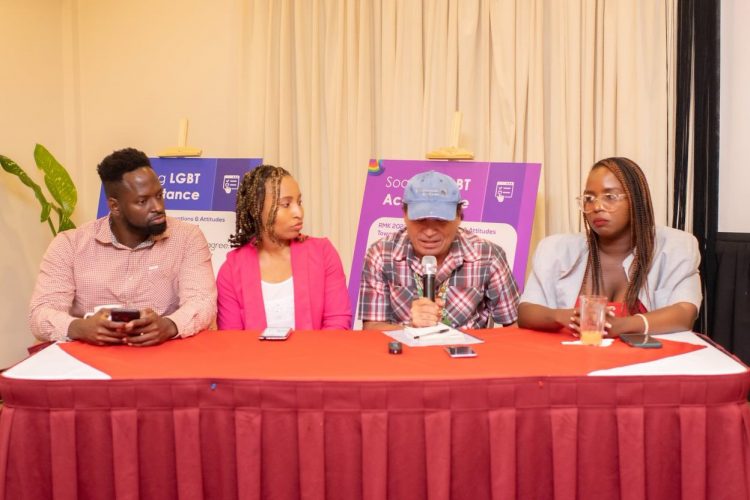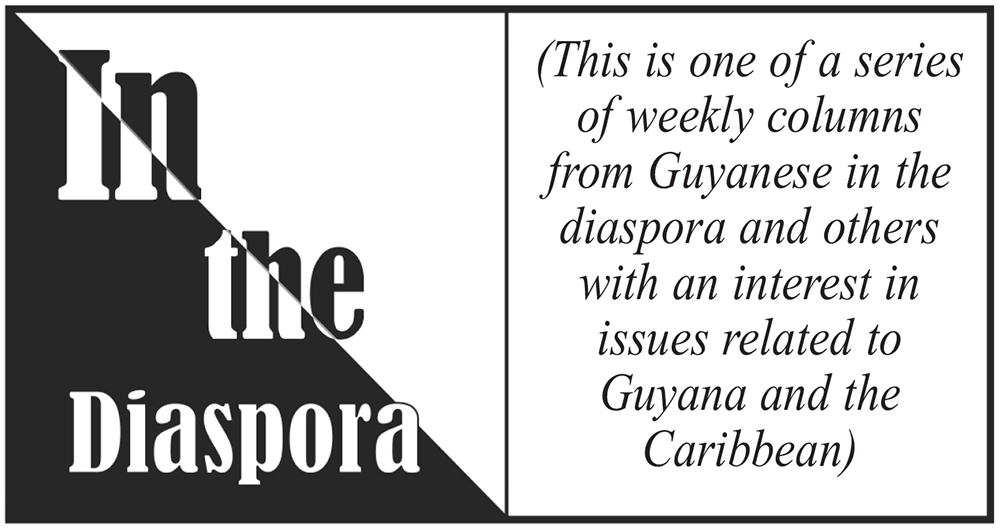By SASOD Guyana’s Human Rights Programme.
This column was written by Human Rights Coordinator Melina Harris and edited by Managing Director Joel Simpson.
As part of our Human Rights programme, SASOD Guyana works with the International Republican Institute (IRI) to facilitate greater democratic participation of marginalised groups. To this end, SASOD Guyana and IRI conceptualized a “Gyaff” focusing on democratic participation, diversity and inclusion which took place at the Herdmanston Lodge on September 28, 2022.
Among participants were a number of civil society groups, representing a wide range of demographics within contemporary Guyanese society. These included groups working on culture, indigenous peoples, youth, children, gender, sexuality, health and other social issues in Guyana. The audience also included university academics, language activists and other outspoken advocates concerned about human rights and democratic participation in Guyana.

The panelists were SASOD Guyana’s Melina Harris, Colin Klautky representing the Guyanese Organisation of Indigenous Peoples (GOIP), and Atesha Christie from Youth Challenge Guyana (YCG). Joel Simpson moderated the discussion on behalf of the Guyana Equality Forum (GEF).
The discussions began with a short introduction from each panelist on the pressing issues faced by the communities they represent and serve. For YCG’s Christie, “what is most challenging for youth is the lack of inclusion” in decision-making. She further lamented that “youth are so underrepresented.” Certainly, there is little to be said about youth representation, participation and inclusion in democratic life in Guyana. And although there are a number of youth-centred organisations in Guyana that focus on the issues affecting young people, there are severe limitations to what these organisations are able to achieve, largely owing to the lack of strong advocates and severely limited resources to execute much-needed programmes for youth.
Working with indigenous communities in Guyana, Mr Klautky stated that GOIP focuses “mostly on education, culture, land rights, cultural rehabilitation, language rights” and other issues affecting Guyana’s first peoples’ right to self-deter-mination in the whole.
Noting the similarities between the plights of indigenous peoples and LGBTIQ+ persons, SASOD Guyana’s Melina Harris also highlighted the issue of self-determination. For LGBTIQ+ people in Guyana, she noted that there “are issues with lack of legal recognition, criminalization, violence, discrimination and a lack of legal protection”. She proffered that “if you don’t have these guarantees as a citizen, then how are you able to actively participate and function in any kind of society?”
The discussion surrounding the human rights of these marginalised groups and what that means for democratic participation preceded what was ultimately a much-needed conversation about colonialism and its ongoing impacts of Guyana’s peoples.
For Guyana’s indigenous peoples, it is particularly important that spaces for these discussions exist where advocates are able to openly discuss how their communities continue to be affected by these issues. Samantha Thomas, a language activist and indigenous woman, shared that the impacts of colonialism are still being felt today by Guyana’s first peoples. Thomas revealed that indigenous peoples were not even allowed to name their children according to their own traditional naming customs during colonialism and even after Guyana gained independence. Many indigenous mothers were forced to adopt “Christian” names for their children instead of names from their own traditional languages. Thomas spoke poignantly about the impact and importance of them using traditional names, speaking indigenous languages and the incredible value of being able and allowed to pass on these traditions to the next generation.
But despite the resurgence of indigenous languages and advocacy for their revitalisation and continued use, it was widely held during the panel discussions that the state, even the post-colonial state, continues to be the main perpetrator of human rights violations, arguably felt by the most vulnerable populations like indigenous peoples and LGBTIQ+ persons, in particular. SASOD Guyana’s Melina Harris noted that the “state is responsible for keeping on the books these discriminatory, colonial-era laws that target LGBTIQ+ people.” She shared that even though “private entities who have discriminatory policies against employing LGBTIQ+ people, discriminatory health-care workers and anti-LGBTIQ+ bullying in schools” also contribute to human rights violations being committed against vulnerable populations; ultimately, the state should be held accountable.
GOIP’s Colin Klautky was able to add some insight into some of the other rights violations which are currently affecting indigenous populations in Guyana. He noted the prevalence of human trafficking and its ties to the mining industry in hinterland regions of Guyana. He stated that, in particular, indigenous women are targeted and that “GOIP is extremely concerned that the situation will worsen with the increased extractive activity in Guyana.” Klautky relayed that young indigenous women are often misled into believing that they are accepting genuine offers of employment but are often tricked by potential employers who ultimately manipulate and keep these women in servitude and slavery. He concluded that, ultimately, “the state is certainly to be blamed for this.”
YCG’s Atesha Christie raised the important point that “many people are not aware of their human rights”, so for young people, the disconnect between them and the state is widened because of this lack of awareness. Furthermore, the fear of victimisation is also a major barrier to young people more actively engaging in democratic processes. Christie opined that there are also no community-support groups for young people in order to cultivate this culture of active democratic participation.
But despite the many challenges which impact democratic participation, diversity and inclusion, the panelists were optimistic about how civil society and Guyanese in general, might be able to use inter-national human rights law and the Guyana constitution to overcome these challenges.
Melina Harris noted that Guyana has signed and ratified crucial human rights treaties but that implementation continues to be a problem. She went on to say that “being cognizant of the fact that we are operating within this particular system and being aware of our shortcomings, I think we still need to utilize whatever procedures or whatever actions we’re able to take to continue to engage that system.” She added that the United Nations human rights mechanisms present an opportunity for civil society to actively participate in sharing data and reporting about the human rights conditions from the communities that they represent and serve.
Klautky added in support that “education is one way to do this, civil society also needs to be empowered. Our organisations need to be strengthened institutionally to do this.” Christie also agreed and stated that “it’s essential for the government to really work with CSOs” because, “we are doing the groundwork. We have the data, we have the information, we have the testimonials. We engage with these people directly so we know exactly what is affecting them.”
Certainly, civil society is willing to engage with the government to tackle the issues affecting Guyana’s vulnerable and marginalised populations, especially as we look at ways of boosting and strengthening democratic participation, inclusion and equity. There is general support for more open fora where citizens can freely ventilate their grievances and concerns about how their democracy is being managed and just how well their government is working to protect their human rights and interests.
There were a number of recommendations made by attendees. The first recommendation concerned the need for more discussions surrounding the nature of democratic participation to be encouraged among the population in general. This recommendation comes as a result of several participants noting the benefits of these open fora to address new and evolving issues affecting various communities while continuing to work on and raise awareness of historic issues and grievances concerning democratic participation.
Secondly, there were recommendations from attendees for greater participation from civil society in discussions around democratic participation, diversity and inclusion. During the course of discussions, it was proposed that the usual adversarial nature of the relationship between civil society and government bodies could be overcome through clear and ongoing dialogue between the government and civic groups. In this way, the organisations that are often on the ground, directly engaging with various communities are able to inform and to collaborate more closely with the government so as to steer policies in a direction which is beneficial to these communities.
Thirdly, it was agreed that another recommendation is for civil society to create and facilitate more engagements, like these discussion fora, town halls and other platforms for ordinary citizens who wish to participate more actively in the democratic process. As civil society groups already work more closely with communities, it was felt that the efforts of these organizations should be increased to raise awareness and help to create a culture of active democratic participation among Guyana’s populace.
Finally, it was recommended that in addition to more fora like these, civil society should attempt to reach other communities in less accessible parts of Guyana so that all of the issues facing the various regions, including those in hinterland communities, could be address-ed and those residents engaged in the democratic process. Possible areas recommended included, Bartica, Mabaruma and Lethem where various indigenous and hinterland populations reside. Ultimately, it was strongly felt that more of these fora should be held in all areas in Guyana.

